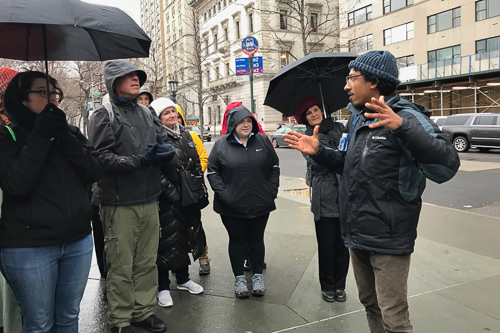What is a Tour Director or Tour Leader?
(And How is it different than a tour guide?)




There are some jobs that don’t show up on career quizzes, and when you discover them, you wonder why you didn’t know about it earlier in your life! Being a tour director, tour leader or tour guide is one of the most rewarding ways to spend your days: interacting with people, traveling the world, exploring and researching new destinations, and delivering experiences to guests that they will remember for the rest of their lives. On behalf of everyone at TripSchool, welcome to the group travel industry, we’re happy you found us!
What is TripSchool? We’re a tour guide & tour leader training organization that helps new and experienced tour directors and guides learn the craft to begin a career in this industry, or take your skills to new level. We also help you start a business, or help your existing business grow and improve.
Tell me more about the group tour industry.
While you may love to travel, you might do it on your own, with a group of friends or loved one, and choose a destination by booking your own flights, choosing museums and attractions to visit, hiring a tour guide, etc. That’s great, and we all do that. Group travel is different. This kind of travel used to be called “escorted tours” – the idea being that you hire a company (a tour operator) to package everything together, and then a tour director or tour guide will lead you through the whole journey. It’s an exhilarating way to travel, because you often see and learn more than doing it on your own, but you have to be ok with groups!
What kind of group tours are there?
A group might be 10 adults who all know each other and decided to purchase a private tour for 5 days to New York City. Or, 40 strangers might come together from all over the world to see the U.S. National Parks for 14 days. Finally, the group could be a high school band of 100 students traveling together to Europe to perform in concerts. The trip might be a general visit to a city or it might be a specialized art history tour of just museums. It could be based on adventure activities like hiking or biking. Or, the tour could be pure leisure: wine tours, luxury hotels, and spa days. Group travel experiences sometimes last half a day, or they can be 30 days of traveling together. The long group travel experiences are called “over the road” tours and they usually involve several destinations across hundreds of miles.
Don’t forget about student tours!
One of the fastest growing sectors in the industry is student travel: taking 8th graders on their class trip to Washington, D.C.. Some people immediately take to this idea, others need convincing. Let us tell you: student tours can be some of the most rewarding trips that you’ll lead, because you’re showing those students places they’ve never been, people they would’ve never met otherwise, and something might spark a change in their life. Student travel changes lives, it really does.

What’s so great about the job?
For many people, discovering tour directing opens up a new world of possibilities for their lives, free from an office. They often wish they’d discovered it sooner. Others realize it is not the life for them. Below, we have tried to spell out as honestly as possible why you should consider becoming a tour director. We also felt it is important to share some of the challenges involved with tour directing as a job and as a lifestyle. First, here are some of the great reasons why you might want to consider working as a tour director:
This is a job for people with a sense of adventure. No two days are alike. Nothing is cookie-cutter. Much of what happens is unpredictable but you can use your creativity and personality to lead your guests on incredible travel experiences. Depending on where you end up working, you may see natural wonders, diverse cities, quiet canyons, or the open seas. It’s a job for people with a yearning to explore.
You bring your own personality to the job. You can tailor the bus activities you do and the stories you tell to suit who you are. You’re not a robot.
Flexibility. You can work where and when you want. Some companies hire you as an employee but most hire you as an independent contractor. You can decide how much you want to work. Some tour directors do just a few tours each year while others work 250+ days on the road. You can take the time off that you want.
You are constantly learning. There’s not a single day that goes by that you’re not learning something new. So much of your job is centered around researching, taking trips, reading books, watching videos, and reading guidebooks in order to learn as much as you can so that you’re prepared to share information with your travelers.
The tour director community is supportive and enriching. This really is not a cutthroat industry. Online forums allow newbies and vets alike to share their helpful hints and commiserate over war stories! There’s a lot of work out there and there is certainly plenty of room for everyone.
You really are making people’s dreams come true. Students have heard from their siblings and classmates about their upcoming trip to New York City. Adults are checking off their bucket lists. These trips are often taken as one of life’s highlights and it feels great to help enrich your travelers’ lives.
You’re a teacher but you don’t have school boards, examinations, or administration breathing down your neck. Lots of ex-teachers come to tour directing as a way to still do what they love without a lot of the headaches.
It’s a very social job. You must enjoy meeting new people, hearing their stories, and sharing the journey with them to be successful in this industry.

And now the challenges…
No job is perfect. And, tour directing is certainly not a job for everyone. We want to be as honest as possible about what this job really entails.
- In this industry, opportunities don’t just fall in your lap. You need to be motivated to send out your resume, network with other tour directors, attend a hiring conference (or two), and continue to learn and train throughout your whole career. For the first 1-3 years, you’re going to need to build up the amount of work you have. A full travel season’s worth of work doesn’t just magically appear.
- It’s a precarious life. Your work schedule is in the hands of companies who may or may not continue to hire you year after year. It’s easier to get work in the spring and summer when there is an abundance of student groups on the road; however, at first, it is harder to fill your fall season with adult and less-frequent student tours.
- Some types of clients may not be right for you. There are luxury groups who demand an elite level of customer service, there are students whose attention needs to be grabbed, and there are groups of families with competing interests. You need to find your niche by knowing yourself, what you like, and what you can handle.
- You’re often working with several companies, juggling expectations, name badges, different itinerary types, and paperwork.
- You’re self employed. This means that you have to pay self-employment tax and cover your own health care, unless a tour company pays for it (few do, and usually only if you’re a full-time employee). However, as a small business owner you are open to all sorts of deductions.
- You’re evaluated by the company and the guests, all the time. You need to grow a thick skin and realize that evaluations and judgements are just part of the job. You’re going to feel that criticism is unfair at times but you can’t let your emotions get the better of you.
- The job is a stress on relationships and friendships. You’re gone constantly, especially if you’re going to make this the only thing you do. Developing a romantic relationship when you don’t see the person for months at a time some times, can be stressful! And you can be lonely on the road. You’ll soon bump into many people you know but it’s for fleeting moments.
- You can’t be a perfectionist. You’ll never be perfectly prepared, or deliver your commentary and handle logistics perfectly. You do the best that you can, but you need to be flexible about changes.

